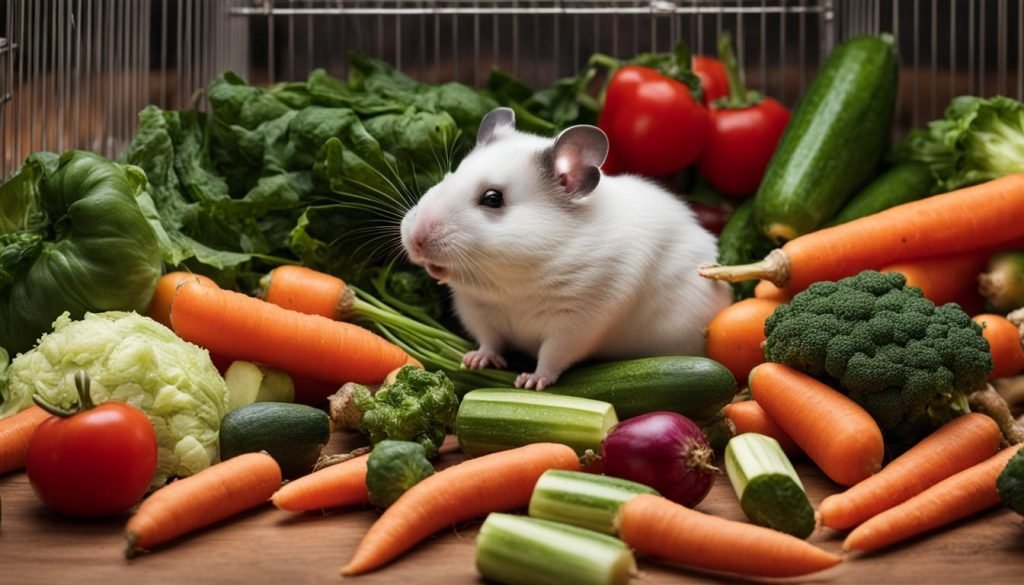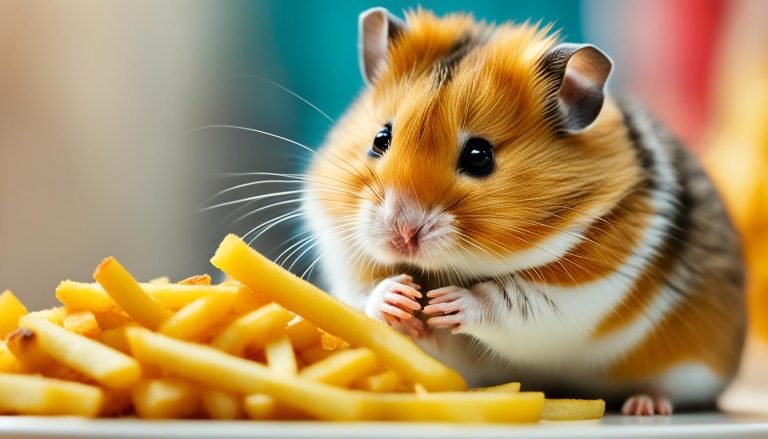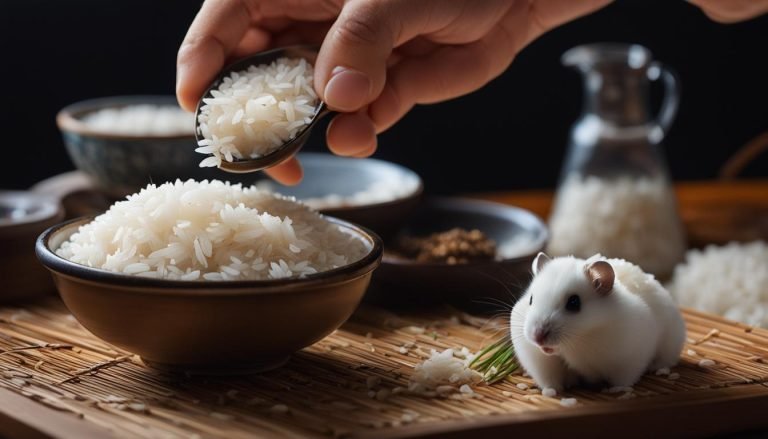Can Hamsters Eat Brussels Sprouts: Safe or Not?
Today, I want to address a common question among hamster owners: Can hamsters eat Brussels sprouts?
If you’re wondering about incorporating this leafy green vegetable into your hamster’s diet, you’re in the right place!

Can Hamsters Eat Brussels Sprouts?
Yes, hamsters can eat Brussels sprouts but in moderation.
When it comes to the foods we offer our furry little friends, it’s essential to ensure their safety and well-being. So, let’s dive into the topic of hamster diets and explore the ins and outs of feeding Brussels sprouts to our adorable hamster companions.
Before we continue, if you want to know why hamsters could potentially enjoy Brussels sprouts, check out this cute hamster enjoying a delicious Brussels sprout snack!
Key Takeaways:
- Brussels sprouts are safe for hamsters to eat in moderation.
- They are low in calories and high in fiber, making them a nutritious addition to a hamster’s diet.
- Introduce new foods gradually and in small quantities to avoid digestive issues.
- Brussels sprouts are packed with essential vitamins and minerals that support a hamster’s overall health.
- Remember to provide a diverse range of safe vegetables to ensure a balanced hamster diet.
The Nutritional Benefits of Brussels Sprouts for Hamsters

Brussels sprouts are an excellent addition to a hamster’s diet due to their abundance of essential vitamins and minerals. These small green vegetables offer a wide range of nutrients that can contribute to a hamster’s overall health and well-being.
One of the key benefits of Brussels sprouts is their high vitamin C content. Hamsters, like humans, cannot synthesize vitamin C on their own and rely on dietary sources. Including Brussels sprouts in their diet helps ensure that hamsters receive this vital vitamin, which plays a crucial role in supporting their immune system and promoting overall health.
In addition to vitamin C, brussels sprouts also contain vitamin K, vitamin A, manganese, folate, potassium, and iron. Vitamin K contributes to proper blood clotting, while vitamin A supports vision and immune function. Manganese aids in bone development, and folate is essential for cell growth and reproduction. Potassium helps regulate fluid balance, and iron is crucial for the transport of oxygen in the body.
By incorporating Brussels sprouts into a hamster’s diet, owners can provide their furry friends with a variety of important nutrients that contribute to a healthy and balanced nutritional profile. However, as with any new food, it is essential to introduce Brussels sprouts gradually and in moderation to ensure that the hamster’s digestive system can adjust.
To visualize the nutritional benefits of brussels sprouts for hamsters, take a look at the following table:
| Nutrient | Function |
|---|---|
| Vitamin C | Supports immune function |
| Vitamin K | Aids in blood clotting |
| Vitamin A | Promotes vision and immune function |
| Manganese | Supports bone development |
| Folate | Essential for cell growth and reproduction |
| Potassium | Regulates fluid balance |
| Iron | Aids in oxygen transport |
Introducing Brussels Sprouts to Your Hamster’s Diet
When it comes to feeding Brussels sprouts to your hamster, it’s important to keep things simple and natural. Always offer fresh, raw Brussels sprouts without any additives or seasonings. Cooked Brussels sprouts are not suitable for hamsters and may cause digestive issues.
To introduce brussels sprouts into your hamster’s diet, start by offering a small piece and observe their reaction. It’s crucial to monitor your hamster for any signs of discomfort or digestive problems. If your hamster tolerates the Brussels sprouts well, you can gradually increase the serving size over time. However, always remember to feed them in moderation.
Other Safe Vegetables for Hamsters
While Brussels sprouts are safe for hamsters, it is important to provide a variety of vegetables to ensure a balanced diet. Offering different vegetables not only adds nutritional variety but also ensures that your hamster receives a range of essential vitamins and minerals.
Here are some other safe and healthy vegetables that you can include in your hamster’s diet:
- Celery
- Cucumber
- Spinach
- Lettuce
- Green beans
- Bell pepper
- Squash
- Pumpkin
- Carrot
These vegetables can be offered to your hamster in small quantities, as part of a well-balanced diet. It is always a good idea to wash them thoroughly before feeding to remove any potential contaminants.
Remember, introducing new foods to your hamster’s diet should be done gradually to prevent any digestive disturbances. Observe how your hamster responds to each new vegetable and adjust the serving size accordingly.
Dental Care and Chewing Materials for Hamsters
Hamsters have teeth that constantly grow, so proper dental care is crucial to ensure their oral health. Chewing is a natural behavior for hamsters and helps them wear down their teeth, preventing overgrowth and potential dental issues.
To fulfill their gnawing needs, it is important to provide hamsters with suitable chewable materials. Here are some recommended options:
- Chewable Hamster Toys: There are various hamster toys available that are designed specifically for chewing. These toys are made from safe and durable materials, providing entertainment while promoting dental health.
- Untreated Softwood Sticks: Hamsters love to chew on untreated softwood sticks, such as apple or willow twigs. These sticks are natural and safe for them to gnaw on, helping to wear down their teeth.
- Heavy-Duty Cardboard: Providing hamsters with small pieces of heavy-duty cardboard can also satisfy their chewing instincts. Cardboard boxes or tubes make great gnawing materials and can keep your hamster’s teeth in good condition.
Remember: Chewing is not only important for dental care but also serves as a form of mental stimulation for hamsters. Make sure to monitor their chewing habits and inspect their teeth regularly. If you notice any signs of overgrown teeth or dental issues, it is essential to seek veterinary care.
Digestion and Moderation in Hamster Diets
Hamsters have sensitive digestive systems, so it is crucial to introduce new foods gradually and in small quantities to prevent tummy upsets. Proper digestion is essential for hamsters to maintain good health and overall well-being.
Introducing new foods: When incorporating new foods into your hamster’s diet, such as Brussels sprouts, it is important to start with a small amount and observe their reaction. Watch for any signs of digestive distress, such as diarrhea or bloating. If your hamster tolerates the new food well, you can gradually increase the portion size.
Moderation is key: While Brussels sprouts and other vegetables can be beneficial for hamsters, overfeeding can lead to digestive issues. It is crucial to provide a balanced diet that includes a mix of hamster food, fresh vegetables, and occasional treats. Be mindful of portion sizes and avoid excessive feeding of any particular food.
The importance of variety: In addition to Brussels sprouts, it is important to offer a variety of vegetables to ensure a well-rounded diet for your hamster. This helps provide a range of nutrients and prevents boredom. Safe vegetable options for hamsters include celery, cucumber, spinach, lettuce, bell pepper, and more. Remember to wash vegetables thoroughly before feeding to remove any potential contaminants.
Monitoring your hamster’s health: Pay attention to your hamster’s digestion, appetite, and overall well-being. If you notice any changes in their eating habits, stool consistency, or behavior, it is important to consult with a veterinarian. They can provide guidance and ensure your hamster’s diet is suitable for their specific needs.
By taking a gradual approach, practicing moderation, and offering a variety of foods, you can help promote healthy digestion and nutrition for your beloved hamster.
Final Thoughts
Based on the information gathered, it is safe to say that Brussels sprouts can be a beneficial addition to a hamster’s diet. These vegetables provide important nutrients such as vitamin C, vitamin K, and potassium, which contribute to a hamster’s overall health and well-being. However, it is important to introduce new foods gradually and in moderation to prevent any digestive issues. Monitoring your hamster’s response to new foods is key.
If you decide to incorporate Brussels sprouts into your hamster’s diet, make sure to offer them in their fresh, raw form, without any additives or seasonings. Cooked Brussels sprouts are not suitable for hamsters. Start with a small piece and observe how your hamster reacts. If there are no adverse effects, you can gradually increase the serving size. Remember to always maintain a balanced diet for your furry friend.
If you have any concerns about your hamster’s diet or health, it is always a good idea to consult with a veterinarian. They can provide professional advice tailored to your specific hamster’s needs. By carefully monitoring your hamster’s diet and overall well-being, you can ensure they enjoy a happy and healthy life.
Similar Posts:
- Can Hamsters Eat Rice? Safe Pet Feeding Tips
- Can Hamsters Eat Potatoes? Safe Snacks Explained
- Can Hamsters Eat Pistachios? Safe Snacks Guide
- Can Hamsters Eat Mushrooms? Safety Guide
- Can Hamsters Eat Mealworms? Safe Snack Guide
- Can Hamsters Eat Crackers? Safe Snack Tips.
- Can Hamsters Eat Asparagus? Safe Feeding Guide
- Can Hamsters Eat Peaches? Safe Snacking Tips
- Can Hamsters Eat Cilantro? Safe Herb Guide
- Can Hamsters Eat Cantaloupe? Find Out
- Can Hamsters Eat Avocado? Diet Safety Tips
- Can Hamsters Eat Pineapple? Safe Snack Guide
- Can Hamsters Eat Green Beans? A Complete Guide
- Can Hamsters Eat Blackberries? Safe Treat Tips
- Can Hamsters Eat Popcorn? Safe Snack Tips
- Can Hamsters Eat Salami? Here’s Why Vets Say No







